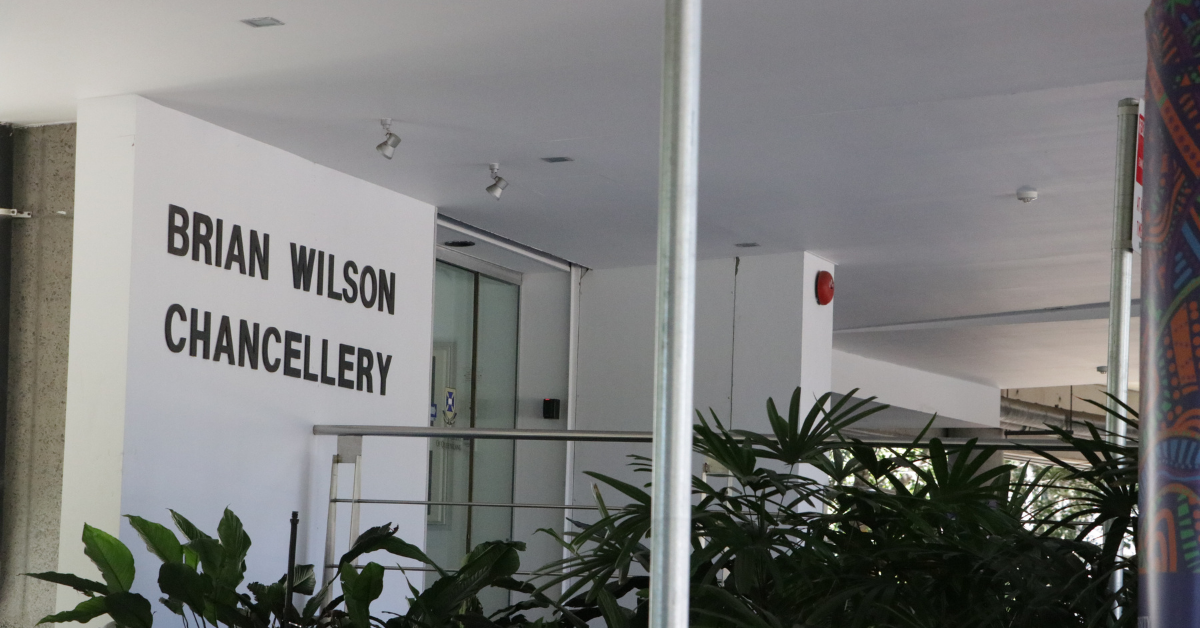
During most people’s introduction to university the UQ administration is their friend, and the student union is their smaller, much poorer friend. Over time however, if they pay attention, students will typically come to a more complete (and cynical) understanding of the various players in the petty power games that underlie the corporate side of tertiary education. For most people this awareness remains shallow, but if you’re reading the student newspaper we figure you’ll be curious enough to want the quick version in advance. So if you’re a clueless first year, an out-of-the-loop post-grad or one of the aforementioned corporate warriors poking their nose into student media for the strategic edge, read on for the condensed version of an undergrad perspective on student-admin relations.
The Central Problem
In the absolute simplest terms, the university is at a point where its main short to medium term goal is money. Of course, their justification is that eventually, in the distant future, they will be able to properly focus on research and education, but until then these lofty goals must take a back seat in favour of whatever is deemed necessary to achieve financial security (or rather, prosperity). In the meantime, students suffer.
Maybe the best illustration of the issue at hand can be found by casting a critical glance at the naïve student’s idea of UQ. They believe that the university is something like the primary or secondary school they attended: an educational institution whose main goal is the intellectual and professional development of its students. And while it bears mentioning that the university is, on some level, definitely dedicated to this, the truth is that it’s only one particular subset of their overall objectives. The goals of the university are a complex set of conflicting interests and ideals, from education, to research, to raking in as much money as possible and advancing the careers of those in charge as well as pursuing the public good.
In recent years, under financial pressure from both government funding cuts and now a drop in enrolment due to COVID-19, UQ’s administrators have become increasingly concerned with securing their revenue streams. For confirmation one need only look at the University’s hyperactive (and well-funded) marketing department, or the KPI’s handed down to our recently departed vice chancellor (concerned mostly with increasing enrolment at any cost), as well as the number of deals being sought with those who can provide sweet funding in exchange for a modest amount of the institution’s dignity and integrity. When a multibillion-dollar institution has to balance the wants and needs of donors, think tanks, governments (at home and abroad) multinational corporate partners, researchers, academics and students, some parties are going to have to lose out. It is no surprise then that the most transient and least established group, the students, have drawn the short straw and bear the brunt of UQ’s corner-cutting (though academics and researchers aren’t too far behind).
Unfortunately for UQ’s management, the student body often doesn’t take kindly to their revenue-raising schemes, which usually involve some combination of a working partnership with the devil, treating students like cash-laden cattle, mercilessly eliminating anything organic or unique and the all-round sucking-of-souls. Unfortunately for students the Administration cares little for any student discontent, especially when listening to student demands would prevent them from pulling in money and require them to admit their errors. In light of this, despite what some may optimistically imagine, the university administration does not answer to students. They answer to their senate, of which students make up a depressingly small part, the few students who make it there being largely powerless to change things anyway. UQ’s goals remain financially inclined and decidedly separate from those of the student body, despite brief and elusive moments of co-operation.
The Solution
We know that the university has goals separate from (and often opposed to) those of students, we know they won’t give students the power to oppose their plans, and in fact that they’ll do their best to suppress any dissent. The only solution, then, is independent co-operation between students, standing up for themselves when the university administration is acting against their best interests. This is the power of a student union and this is why for much of the union’s existence the university has been trying to shut it down, starve it of funding or replace it. No matter how nice UQ’s administration may be at any given point, the only body which can truly represent students is an independent student union.
After taking in the above, especially if you’re unfamiliar with the theatre of student politics, you may be quite confused. That’s alright, most people don’t think about these things until their 3rd year, if they actively think about them at all. Regardless, if you’re interested in seeing these issues in practice, read on and familiarise yourself with a couple of UQ’s grand plans which form the ongoing struggles of student unionism in 2021:
Bulldozing the Union
Over the years the university administration has cleverly been siphoning assets from the union with the help of those willing to sell them. Notable examples here include union college, and the entire union complex, who some bright spark decided the student union could do without. Meanwhile the union complex (including the beloved Schonell Theatre) is in an even more dire situation, slated to be knocked down. This is, of course, intentional. It’s hard to fight a multibillion-dollar University’s grand plans when you’re losing income, even harder when your community hub is reduced to a small cube. Besides, the union complex is both a bit daggy and a centre of genuine student life, neither popular with UQs management team who prefer brand new blocks of sterile, partitioned rooms. For them it’s more about which buildings will look good enough in a brochure to increase enrolment, rather than what’s comfortable for, or valued by students. By the time you figure out that their priorities don’t involve you you’re probably about to graduate, so why would they care?
UQ Life
Speaking of UQ’s management team and denying the union funding, the university has decided that if they can’t beat the union they should replace it. Enter “UQ life” an attempt by the University to justify taking large amounts of student money and putting it into sub-par events, safely controlled by professionals rather than the grubby little undergrads who actually attend these gatherings. Predictably something so inorganic and cynically engineered to remove student life from the control of students has not taken off a great deal, even if it takes a great deal of money from the union.
Slashing Courses
Unfortunately, the changes students are facing aren’t just social or “around the edges” as it were. And it’s not just students facing them. A great number of courses have had their funding cut or have been removed completely. Several of the best courses I’ve done aren’t planned to be offered ever again. Over half of the philosophy electives on offer when I arrived at UQ are now gone too. Of course the most popular, employable, milquetoast courses won’t have to fear dissolution, though the amount the university spend on each student will likely keep decreasing, even if those students’ fees don’t.
Conclusion
Though the above offers a grim picture of the state of things, there is definitely life in the union yet. Student community endures and there remain great things to do and people to meet. Nevertheless, keep an eye out because this likely won’t be the last time you see or read about these issues while you’re at UQ.
I would like to finish with a disclaimer: this piece is not intended to frame this issue as the staff vs students. UQ’s administrative staff, though powerful, is still only a minority. The majority of UQ’s staff: lecturers, tutors, counsellors, cleaners, etc. Are wonderful people who respect and are respected by students. They have helped me in my time here and I’m grateful for that. The problem is that their help often comes in spite of, not because of the administrative bloat at the top of the university, in fact I’m sure plenty of staff have been pushed around by them just as students have. I’m even willing to note that I’m sure there are good people in the administration doing the right thing, sympathetic to student concerns. Nevertheless their behaviour so far has been decidedly anti-student union and anti-student. This piece is about the issue of students vs emotionless bean-counters, about decency and respect vs smug sneering superiors, and most importantly people over profits. If you’re a student or a sympathetic staff member, keep your wits about you and your chin up, if you’re an administrator, please, just listen.
Views: 577
